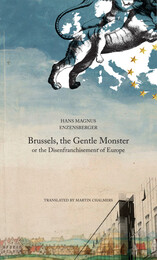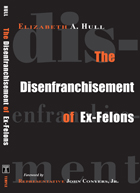2 books about Disenfranchisement

Brussels, the Gentle Monster
or the Disenfranchisement of Europe
Hans Magnus Enzensberger
Seagull Books, 2011
The inner workings of the European Union are as much a mystery to those living within its confines as they are to those of us who reside elsewhere. The Brussels bureaucracy that sets many of the EU’s policies feels remote to its citizens, yet the influence of its decisions can extend worldwide and throughout the global marketplace.
In this timely and insightful essay, Hans Magnus Enzensberger blends reportage, argument, and analysis in order to make sense of the EU’s present political and economic roles and examine the EU’s origins and inherent contradictions. In Enzensberger’s view, Europe is involved in a project without precedent—the first non-violent form of post-democratic governance, which is trying to abolish the diversity of Europe and impose a regime that is not accountable to its citizens. Its often bizarre and arbitrary rules amount to a soft but relentless guardianship, dictating how half a billion people should live their lives regardless of their own political opinions and traditions. Enzensberger here offers a strategy for approaching this modern monster—at once gentle and giant, friend and foe.
Praise for Enzensberger
“How should one cope with Germany? Let’s ask Hans Magnus Enzensberger. . . . One can only marvel at his permanent alertness, his tone of cold enragement, the dimensions of his hunger for experience, most of all however, one can only marvel at his sense of important issues. For 50 years, time and again Enzensberger has posed the right questions to German society. . . . No one should ever believe Enzensberger is on his side. Whenever someone makes a clear distinction between Good and Evil, Enzensberger will jump out of his cover and shout: It’s not that simple.”—Florian Illies, Die Zeit
[more]

The Disenfranchisement of Ex-Felons
Elizabeth A. Hull, foreword by Representative John Conyers, Jr.
Temple University Press, 2006
In the 2004 presidential election, 4,686,539 Americans—a population greater than the city of Los Angeles—were barred from the polls. In a country that has extended suffrage to virtually every other class of citizen, ex-felons are the sole segment of our population deemed unworthy to exercise what the Supreme Court has called "the right preservative of all other rights," the right to vote.
The Disenfranchisement of Ex-Felons provides a comprehensive overview of the history, nature, and far-reaching sociological and political consequences of denying ex-felons the right to vote. Readers learn state practices in Florida and Ohio during the 2000 and 2004 presidential elections; arguments that have been used in court houses, legislatures, and the press to justify such practices; and attempts to reverse legislation through state and federal governments. In a timely appendix to the 2004 election, Elizabeth Hull makes her case that the battle for civil rights will not be won unless ex-felons, who have fulfilled their obligations to society, are restored the same rights afforded all other American citizens.
The Disenfranchisement of Ex-Felons provides a comprehensive overview of the history, nature, and far-reaching sociological and political consequences of denying ex-felons the right to vote. Readers learn state practices in Florida and Ohio during the 2000 and 2004 presidential elections; arguments that have been used in court houses, legislatures, and the press to justify such practices; and attempts to reverse legislation through state and federal governments. In a timely appendix to the 2004 election, Elizabeth Hull makes her case that the battle for civil rights will not be won unless ex-felons, who have fulfilled their obligations to society, are restored the same rights afforded all other American citizens.
[more]
READERS
Browse our collection.
PUBLISHERS
See BiblioVault's publisher services.
STUDENT SERVICES
Files for college accessibility offices.
UChicago Accessibility Resources
home | accessibility | search | about | contact us
BiblioVault ® 2001 - 2024
The University of Chicago Press









